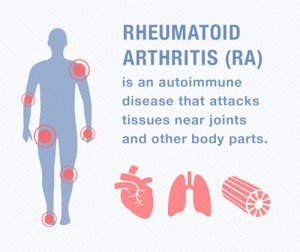
Photo courtesy of Healthline
If you know anyone with Rheumatoid arthritis then you know how grueling the disease can be on the human body. More than 1.5 million Americans have rheumatoid arthritis at any given time (arthritis.org). To clear up any confusion, rheumatoid arthritis (RA) can bring stiffness, swelling, and pain to the joints (WebMD). There is no known cure for the disease, although there are some steps that can be taken to hinder some of the symptoms. I personally know some people who suffer with RA and I wanted to study whether RA could lead to early death, specifically cardiovascular death. Over time I have heard different opinions on the long term effects of RA on the human body. Does rheumatoid arthritis lead to early cardiovascular death, and if so, how much does it differ from the average person?
In first tackling this issue I observed two studies. The first journal, published by the American College of Rheumatology was a population-based study that ran from 1987 to 2001 (Wiley Online Library). This study would be considered a longitudinal study, since it ran for 14 years and collected data from over a span of 46 years. The x variable in the case of this study would most likely be the actual disease rheumatoid arthritis, while the y (response) variable would be the risk of cardiovascular death. The null hypothesis is that RA does not have any effect on the risk of cardiovascular death. The alternative hypothesis we are testing is that RA does have an impact on the risk of cardiovascular death.
To conclude, there does seem to be a positive correlation between RA and an increased risk of cardiovascular death. The study found a correlation with a P-value of less than .01, giving reason to deem the conclusion as statistically significant. Could this conclusion be a false positive? It could be, however we have enough reason to believe that it is likely not a false positive.

Photo courtesy of Earth Times
Something that should be noted is the use of corticosteroids, DMARDS, and NSAIDs were used by most patients. One thought is that the medicine used to lessen the symptoms of RA such as the ones listed above could actually be confounding variables that could lead to higher cardiovascular death rates. The reason why this limitation could not be accounted for is due to ethical reasons. It would have been unethical for the researchers to have half of the study group not use medicine commonly prescribed to RA patients.
Unfortunately there is not a more accurate method to determining whether RA leads to higher risks of cardiovascular death. The ACR study did a decent job in deciphering whether the correlation is causal. As research on RA and drugs progresses, we will hopefully establish a better understanding on not only RA, but the drugs that are used to treat RA. There is a noticeable correlation between RA and the risk of cardiovascular health. The solution I have come to is that the correlation is causal. Rheumatoid arthritis is known to become progressively worse over time. The mechanism for how RA could increase cardiovascular death risks is still unknown. The disease is known to affect joints so how could it lead to heart failure? At this point we are not sure.
Works Cited:
“Cardiovascular death in rheumatoid arthritis: A population-based study.” American College of Rheumatology. Wiley Online Library, onlinelibrary.wiley.com/doi/10.1002/art.20878/full.
“What Are the Symptoms of Rheumatoid Arthritis?” Web MD, www.webmd.com/rheumatoid-arthritis/guide/rheumatoid-arthritis-symptoms. Accessed 18 Oct. 2016.
“What is Rheumatoid Arthritis?” Arthritis Foundation, www.arthritis.org/about-arthritis/types/rheumatoid-arthritis/what-is-rheumatoid-arthritis.php. Accessed 19 Oct. 2016.
